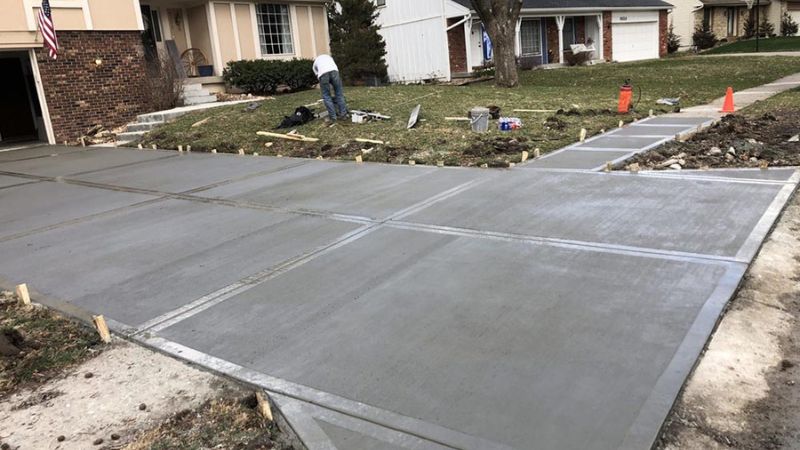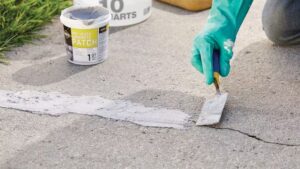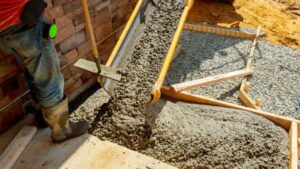When it comes to choosing between an asphalt or concrete driveway, homeowners often face a tough decision. Both materials have their distinct advantages and are suited for different needs. Asphalt driveways are known for their lower upfront costs and quicker installation, while concrete driveways offer longer-lasting durability and a more polished appearance. Your choice depends on several factors, including climate, maintenance, budget, and aesthetic preferences. In this blog, we’ll break down the key differences between asphalt and concrete driveways, helping you make an informed decision for your home.
Asphalt vs Concrete Driveway
Asphalt Driveway Overview
Asphalt is a common material used for driveways due to its low upfront cost and faster installation time. One of the main benefits of asphalt is its flexibility. Asphalt can expand and contract with changes in temperature, making it particularly useful in areas that experience extreme weather conditions. This flexibility helps reduce the risk of cracking, especially in colder climates where freeze-thaw cycles are common. In terms of installation, asphalt driveways can be ready for use within a day or two after laying, making it a quick solution for homeowners who need a new driveway without waiting weeks for it to cure.
Maintenance is an important factor to consider with asphalt. While the initial cost is lower, asphalt driveways require periodic sealing every 3-5 years to maintain their appearance and functionality. Without regular maintenance, asphalt can degrade faster due to exposure to UV rays, chemicals, and moisture. Over time, small cracks may appear, but these can be easily repaired with patching, keeping the driveway in good condition. Overall, asphalt is a budget-friendly option for those willing to invest in regular upkeep.
Also Read:- Different Types Of Concrete Strengths
Concrete Driveway Overview
Concrete driveways are known for their strength and durability, often lasting 30 years or more with minimal maintenance. Unlike asphalt, which requires frequent resealing, concrete is much lower maintenance. Once installed, a concrete driveway only needs occasional cleaning and resealing every 10 years or so to keep it in top shape. This makes concrete a popular choice for homeowners who want a long-lasting solution with less routine upkeep. Another advantage is the aesthetic versatility of concrete. It can be customized with different textures, patterns, and colors, allowing homeowners to create a more personalized look that complements their home’s architecture.
While concrete offers superior durability, it does come with a higher price tag. The installation process is more labor-intensive and time-consuming, often taking up to a week to complete and fully cure. Additionally, in colder climates, concrete is more prone to cracking due to its rigid nature and inability to flex with temperature changes. This can lead to issues with freeze-thaw cycles where water seeps into cracks, freezes, and expands, causing further damage. However, with proper installation and the use of control joints, these issues can be minimized. Despite the higher upfront cost, many homeowners find concrete to be a worthwhile investment due to its longevity and ability to enhance curb appeal.
Cost Comparison
One of the primary factors that influence the decision between asphalt and concrete is the cost. Asphalt is generally less expensive than concrete, with prices typically ranging from $2 to $4 per square foot. This makes it a more budget-friendly option for homeowners looking to install a new driveway without breaking the bank. However, asphalt’s lower cost does come with the trade-off of more frequent maintenance and repairs, which can add to its long-term expenses. Over the lifespan of an asphalt driveway, you may end up spending more on upkeep than you initially anticipated.
Concrete, on the other hand, is more expensive upfront, with installation costs ranging from $4 to $8 per square foot. This higher price reflects not only the material cost but also the more labor-intensive installation process. Despite the higher initial investment, concrete’s longer lifespan and minimal maintenance requirements can make it more cost-effective in the long run. Homeowners who opt for concrete may spend less over time since they won’t need to invest in regular repairs and resealing like they would with asphalt. When deciding between the two, it’s important to consider both the short-term and long-term costs.
Durability and Longevity
Concrete clearly wins when it comes to durability. A well-maintained concrete driveway can last 30 years or more, making it a long-term investment. Its resistance to wear and tear, heavy loads, and changing weather conditions make it a solid choice for homeowners looking for a driveway that can stand the test of time. Asphalt, while durable, typically has a lifespan of 20 years with regular maintenance. However, in areas with extreme weather fluctuations, asphalt may wear down more quickly, requiring more frequent repairs.
Asphalt is better suited for colder climates due to its ability to expand and contract, reducing the likelihood of cracking. Concrete, while more durable overall, is prone to cracking in freeze-thaw conditions. However, with proper care and the use of control joints, these issues can be mitigated. Both materials are capable of handling heavy loads, but concrete is generally better suited for driveways that will experience frequent heavy vehicle traffic. Ultimately, the decision between asphalt and concrete will depend on your specific climate and the expected use of the driveway.
Aesthetic Appeal and Customization
Another important consideration is the aesthetic appeal of your driveway. Asphalt driveways offer a sleek, dark look that blends in well with most landscapes. However, its appearance can fade over time, especially if not properly maintained. On the other hand, concrete driveways offer more customization options. Homeowners can choose from a variety of textures, patterns, and even colors to match their personal style and the design of their home. Concrete that has been stamped or tinted can resemble real stone or pavers, giving the appearance of more expensive materials without having to pay as much.
While concrete offers more aesthetic versatility, it can be prone to staining from oil, chemicals, and tire marks. Regular cleaning and sealing can help protect the surface and maintain its appearance. Asphalt, while easier to repair and less expensive to install, doesn’t offer the same level of customization. If appearance is a major factor in your decision, concrete may be the better choice for creating a driveway that enhances your home’s curb appeal.
Also Read:- Tips For Choosing The Right Concrete Mix
Environmental Impact
The environmental impact of your driveway material is another factor to consider. Asphalt is made from petroleum products, making it less environmentally friendly than concrete. The production of asphalt contributes to greenhouse gas emissions, and the material itself is not biodegradable. However, asphalt can be recycled, and old asphalt driveways can be repurposed into new paving projects, reducing waste. Concrete, while more sustainable in terms of longevity, also has environmental drawbacks. One of the main sources of CO2 emissions in the production process is cement, an essential component of concrete.
There are eco-friendly alternatives available for both materials. For asphalt, using recycled asphalt products (RAP) can significantly reduce the environmental impact. For concrete, using fly ash or slag as a partial replacement for cement can help lower CO2 emissions. Additionally, concrete’s reflective surface helps reduce the urban heat island effect, making it a more sustainable choice for warmer climates. When evaluating the environmental impact, it’s essential to weigh the pros and cons of both materials and consider incorporating recycled or eco-friendly options in your driveway project.
Conclusion
Deciding between an asphalt or concrete driveway ultimately depends on your priorities. If you’re looking for affordability and ease of repair, asphalt may be the better option. On the other hand, if you want a long-lasting and visually appealing solution, concrete might be your best bet. Both materials have their pros and cons, so carefully consider your specific needs and environment before making a choice.
FAQs
Which driveway material lasts longer, asphalt or concrete?
Concrete generally lasts longer, up to 30 years or more, while asphalt typically lasts around 20 years with proper maintenance.
Is asphalt or concrete better for cold climates?
Asphalt is better suited for cold climates, as it is less prone to cracking from freeze-thaw cycles compared to concrete.




